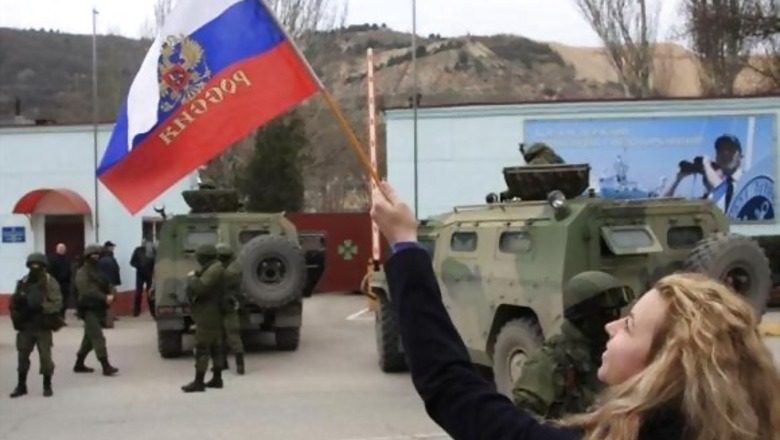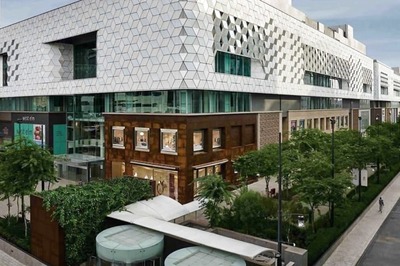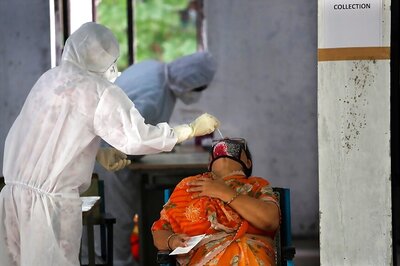
views
Russia issued an ultimatum Monday, demanding that the crew of two Ukrainian warships in Crimea immediately surrender or be stormed and seized, a Ukrainian military spokesman said.
Four Russian navy ships in Sevastopol harbor were blocking the Ukrainian anti-submarine warship Ternopil and the command ship Slavutych from leaving the dock, waiting for their commanders' responses, spokesman Maksim Prauta said.
Vladimir Anikin, a Russian defense ministry spokesman in Moscow, dismissed the report of a Russian ultimatum as nonsense but refused to elaborate.
Elsewhere on the strategic peninsula, Russian troops controlled all Ukrainian border posts Monday in Crimea, as well as all military facilities and a key ferry terminal. Now, fears in Kiev and beyond were that Russia might target and seize other parts of Ukraine, in particular parts of its pro-Russian east, the country's industrial powerhouse and agricultural breadbasket.
As diplomats met in Brussels, Kiev and Geneva, warnings about the threat posed by Russia's military invasion were issued from a host of European capitals.
"We are in the most serious crisis for Europe since the fall of the (Berlin) Wall. Twenty-five years after the end of the conflict between east and west, there's a real danger of a split in Europe," German Foreign Minister Frank-Walter Steinmeier said in Brussels.
"Anyone who follows the news can see that the escalation isn't stopping. On the contrary, the threats from the Russian side are only getting louder," he added.
Earlier in the day, Russian Foreign Minister Sergey Lavrov, in Geneva to attend UN meetings, explained the reasoning behind Russia's military invasion of Crimea.
"This is a question of defending our citizens and compatriots, ensuring human rights, especially the right to life," he said.
There have been no reports, however, of any hostilities toward Russian-speakers in Ukraine during the country's four months of political upheaval.
The Russian Foreign Ministry also pressed hard Monday for Ukrainian politicians to return to the Feb. 21 agreement that promised to create a new unity government which would rule until an early election no later than December. The proposal seemed to be a non-starter for the West, however, for it would void the new government that Ukraine installed last week.
Tensions between the two former Soviet neighbors rose sharply after Ukrainian President Viktor Yanukovych was pushed out by a protest movement made up of people who wanted closer ties with the European Union, more democracy and less corruption. Yanukovych fled to Russia last month after more than 80 demonstrators were killed - mostly by police - near Kiev's central square but insists he is still president.
In Kiev, Ukraine's new prime minister admitted his country had "no military options on the table" to reverse Russia's military move into its Crimea region.
While Prime Minister Arseniy Yatsenyuk appealed Monday for outside help and insisted that Crimea still remained part of his country, European foreign ministers held an emergency meeting on a joint response that could include economic sanctions against Russia.
"Any attempt of Russia to grab Crimea will have no success at all. Give us some time," Yatsenyuk said at a news conference with British Foreign Secretary William Hague in the Ukrainian capital of Kiev.
But he added that "for today" there were "no military options on the table." He said his country was "urgently" asking for economic and political support from other countries.
"The U.K is not discussing military options. Our concentration is on diplomatic and economic pressure," Hague said.
US Secretary of State John Kerry was heading to Ukraine on Tuesday after demanding that Russian President Vladimir Putin pull back from "an incredible act of aggression."
In the meantime, Russian forces were clearly in charge in Crimea, home to 2 million mostly Russian-speaking people and landlord for Russia's critical Black Sea Fleet at Sevastopol.
In addition to seizing barracks and border posts, troops also controlled a ferry terminal in the Ukrainian city of Kerch, just 20 kilometers (12 miles) across the water from Russia. That intensified fears in Kiev that Moscow will send even more troops into the peninsula via that route.
Border guard spokesman Sergei Astakhov said the Russians were demanding that Ukrainian soldiers and guards transfer their allegiance to Crimea's new pro-Russian local government.
"The Russians are behaving very aggressively. They came in by breaking down doors, knocking out windows, cutting off every communication," he said.
He said four Russian military ships, 13 helicopters and 8 transport planes had arrived in Crimea in violation of agreements that permit Russian to keep its Black Sea fleet at the naval base in Sevastopol.
Ukraine is also struggling on the financial front. The treasury is almost empty and its currency is under pressure after years of running large deficits. The International Monetary Fund said a fact-finding mission would visit Ukraine starting Tuesday for 10 days. Ukraine has asked the IMF for rescue loans and says it needs $35 billion to pay its bills over the next two years.
Market reaction to the Russian invasion of Crimea was immediate Monday. In European trading, gold and oil rose while the euro and stock markets fell. The greatest impact was felt in Moscow, where the main RTS index was down 12 percent at 1,115 and the dollar spiked to an all-time high of 37 rubles.
Russia's central bank hiked its main interest rate 1.5 percentage points Monday to 7 percent, trying to stem financial outflows.
Gazprom, the Russian energy giant, was also big loser, its share price down 13 percent as investors worried about how it would get its gas to Europe if hostilities kept up, since much of it goes through Ukrainian pipelines.
Putin has rejected calls from the West, insisting that Russia has a right to protect its interests and those of Russian-speakers anywhere in Ukraine. His confidence is matched by the knowledge that Ukraine's 46 million people have divided loyalties - while much of western Ukraine wants closer ties with the 28-nation European Union, its eastern and southern regions like Crimea look to Russia for support and trade.
Faced with the Russian threat, Ukraine's new government has moved to consolidate its authority, naming new regional governors in the pro-Russia east, enlisting the support of the country's wealthy businessmen and dismissing the head of the country's navy after he declared allegiance to the pro-Russian government in Crimea.
NATO held an emergency meeting in Brussels and the US, France and Britain debated the possibility of boycotting the next Group of Eight economic summit, to be held in June in Sochi, the host of Russia's successful Winter Olympics.




















Comments
0 comment